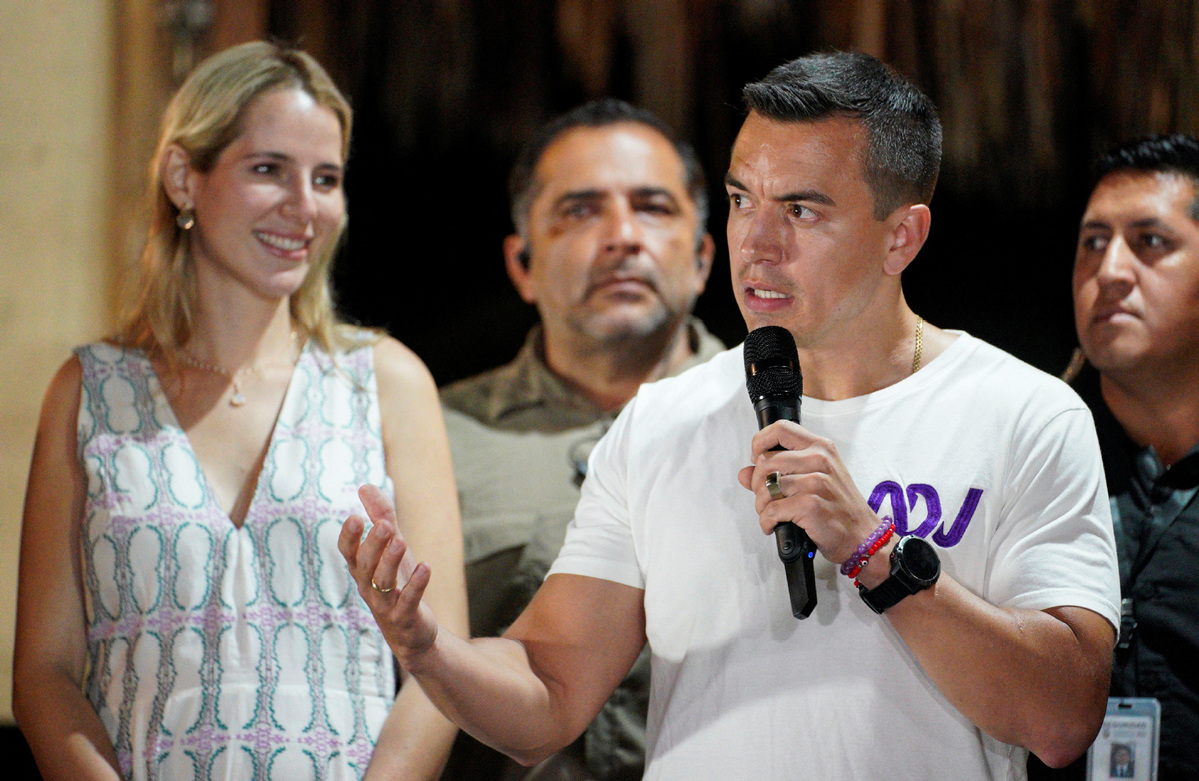Ecuador's Noboa faces tough road ahead
By SERGIO HELD in Bogota, Colombia | chinadaily.com.cn | Updated: 2023-10-16 17:19
Young president-elect has his tasks cut out amid a populace fed up with crime, graft, economic woes

Daniel Noboa, 35, son of Ecuador's richest man, will become the country's youngest ever president after winning a tightly contested runoff election on Oct 15, ending a difficult campaign marred by violence and underscored by promises for change.
The center-right candidate will take over a country of some 17 million people who are disenchanted with endemic corruption, tired of gang-related violence and limited prospects for growth.
Noboa won with 52.3 percent of the vote, defeating Luisa Gonzalez who obtained 47.7 percent. Despite security concerns, voter turnout was high at 82.33 percent.
"Starting tomorrow, Daniel Noboa, your president of the republic, starts working," Noboa told reporters after the results were announced.
Gonzalez, for her part, conceded and congratulated the president-elect.
Ecuador, a small country in South America, is marked by massive social and economic instability, powerful organized crime groups and a fiscal deficit equivalent to 2 percent of GDP. The Andean nation has seen murder rate surge by 245 percent between 2020 and 2022.
"There are multiple crises in Ecuador: An economic crisis, a political crisis, a crisis of insecurity, a social crisis, but mainly a crisis of confidence," said Wilson Merino, a member of the city council in the national capital Quito.
"People don't trust their authorities. People don't trust the institutions. People don't trust the mayors, the prefects, the presidents. People don't trust the police. And it is very difficult to move forward in this way. It seems to me that this crisis of confidence has also marked the (election) campaign."
"The main challenge we have as a society is to rebuild the social fabric, this social fabric that is so broken with violence at all levels, physical violence but also political violence, violence in the networks, violence everywhere, this polarization," Merino added.
Campaigning kicked off when President Guillermo Lasso, facing impeachment, dissolved the legislature on May 19 and triggered fresh elections of the legislative body and the presidency. He did not run in the latest election.
Eight candidates participated in the first round of polls, but that campaign was marred by violence.
Fernando Villavicencio, a candidate who had been campaigning on an anti-corruption platform, was killed days before the first round of voting on Aug 20 as he was about to give a speech. Seven suspects in that killing were assassinated days before the Oct 15 runoff, in two different prisons.
Gonzalez is a former lawmaker affiliated with ex-president Rafael Correa (2007-17), who is currently living in exile in Belgium. She represents Correa's Citizen Revolution movement.
Noboa's father Alvaro, a banana tycoon, ran for the presidency unsuccessfully five times in the past. He represents the National Democratic Action movement, which he started.
"Noboa managed to sneak into the second round because he had maintained, perhaps, a less confrontational tone in the first round, perhaps a profile more distant from the language of confrontation to which we were accustomed," said Merino. "Generally speaking, people are fed up with disputes, with the superficial, epidermal confrontation between politicians. What people are demanding are answers."
Given his status, however, there is a concern that he would defend the interests of some powerful groups, without a clear political structure.
The differences between the two candidates have been stark.
Noboa has focused on the future and implementing policies to drive economic growth and integrate the country into the global economy while taking steps to deal with overcrowded prisons, which were the site of at least 18 massacres in 2023 alone.
Gonzalez has highlighted her experience and the fact that violence has exploded, and economic conditions worsened in the years after her partly last held office. Like Noboa, however, she has tried to set herself apart from the previous political culture and the corruption that has become endemic in the country.
"There is an erosion of existing organizations and political parties and, it seems to me, that this is a time to reflect internally on how to rethink and redefine politics," Merino said.
The writer is a freelance journalist for China Daily.
























